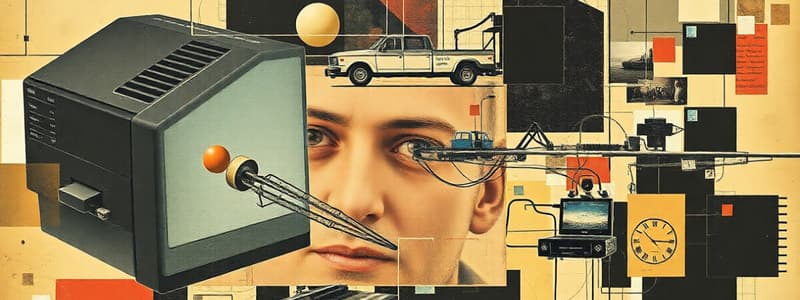Podcast
Questions and Answers
The most common text input device is the ______.
The most common text input device is the ______.
keyboard
The standard layout for keyboards is known as ______.
The standard layout for keyboards is known as ______.
QWERTY
Most keyboards have a standardized layout, allowing for rapid entry of text by experienced ______.
Most keyboards have a standardized layout, allowing for rapid entry of text by experienced ______.
users
Alternative keyboard designs, like the ______, allow faster typing but face resistance due to QWERTY's popularity.
Alternative keyboard designs, like the ______, allow faster typing but face resistance due to QWERTY's popularity.
Many keyboards can be connected by ______, but there are also wireless options.
Many keyboards can be connected by ______, but there are also wireless options.
Special keyboards may be designed to reduce fatigue from ______ or for one-handed use.
Special keyboards may be designed to reduce fatigue from ______ or for one-handed use.
The ______ layout is often criticized for not being optimal for typing speed.
The ______ layout is often criticized for not being optimal for typing speed.
Accented symbols on keyboards are necessary for different ______.
Accented symbols on keyboards are necessary for different ______.
A computer system is made up of various ______.
A computer system is made up of various ______.
Input devices include text entry and ______.
Input devices include text entry and ______.
Output devices can be a screen, digital paper, or ______.
Output devices can be a screen, digital paper, or ______.
Memory includes RAM and ______ media.
Memory includes RAM and ______ media.
A typical computer system may consist of a screen, keyboard, and ______.
A typical computer system may consist of a screen, keyboard, and ______.
Most modern computing is characterized by ______ feedback.
Most modern computing is characterized by ______ feedback.
Examples of computers in our pockets include phones and ______.
Examples of computers in our pockets include phones and ______.
Is ______ always better in computing?
Is ______ always better in computing?
The ______ keyboard is designed specifically for left-handed users.
The ______ keyboard is designed specifically for left-handed users.
T9 predictive entry allows you to type by using ______ as if a single key for each letter.
T9 predictive entry allows you to type by using ______ as if a single key for each letter.
Handwriting recognition captures information like stroke path and ______.
Handwriting recognition captures information like stroke path and ______.
The ______ is a common handheld pointing device that allows for easy interaction with computers.
The ______ is a common handheld pointing device that allows for easy interaction with computers.
Numeric keypads, unlike standard keyboards, are specifically designed for entering ______.
Numeric keypads, unlike standard keyboards, are specifically designed for entering ______.
Speech recognition is most effective when there is a ______ user that it has been trained to recognize.
Speech recognition is most effective when there is a ______ user that it has been trained to recognize.
A ______ is often used for physical interaction in positioning tasks such as drawing or navigating.
A ______ is often used for physical interaction in positioning tasks such as drawing or navigating.
Problems with speech recognition include external noise and imprecision in ______.
Problems with speech recognition include external noise and imprecision in ______.
The movement of the mouse moves the screen ______.
The movement of the mouse moves the screen ______.
Mechanical mice use a ball on the underside that turns as the mouse is ______.
Mechanical mice use a ball on the underside that turns as the mouse is ______.
Optical mice use a light emitting ______ on the underside.
Optical mice use a light emitting ______ on the underside.
Foot controls are commonly found in car ______.
Foot controls are commonly found in car ______.
Touchpads are primarily used in ______ computers.
Touchpads are primarily used in ______ computers.
Trackballs rotate within a ______ housing.
Trackballs rotate within a ______ housing.
The pressure of the stick on a joystick correlates with the ______ of movement.
The pressure of the stick on a joystick correlates with the ______ of movement.
Touch-sensitive screens detect the presence of a finger or ______ on the screen.
Touch-sensitive screens detect the presence of a finger or ______ on the screen.
Anti-aliasing softens edges by using shades of ______ colour.
Anti-aliasing softens edges by using shades of ______ colour.
A cathode ray tube emits a stream of ______ focused by magnetic fields.
A cathode ray tube emits a stream of ______ focused by magnetic fields.
Phosphor-coated screens used in cathode ray tubes ______ when struck by electrons.
Phosphor-coated screens used in cathode ray tubes ______ when struck by electrons.
Health hazards from CRT include exposure to ______, UV and IR radiation.
Health hazards from CRT include exposure to ______, UV and IR radiation.
Liquid crystal displays are smaller, lighter, and have no ______ problems.
Liquid crystal displays are smaller, lighter, and have no ______ problems.
Voltage applied to a crystal in an LCD changes its ______, affecting the color.
Voltage applied to a crystal in an LCD changes its ______, affecting the color.
Health hints for CRT use include not sitting too ______ to the screen.
Health hints for CRT use include not sitting too ______ to the screen.
Large displays are typically used for meetings and ______.
Large displays are typically used for meetings and ______.
Flashcards are hidden until you start studying
Study Notes
Computer Systems
- A computer system is comprised of various elements, each affecting the user interaction.
- Input devices include keyboards, mice, touchpads, and speech recognition systems.
- Output devices include screens, paper, and virtual reality systems.
- Physical interaction includes sound, haptic feedback, and bio-sensing.
- Memory includes RAM and permanent media, affecting the system's capacity and access speed.
- Processing power refers to the speed of computations, influenced by network connectivity.
Interacting with Computers
- Understanding human-computer interaction requires understanding computer systems.
- Components include input devices, output devices, memory, processing power, and networks.
Typical Computer Systems
- Common systems include desktops, laptops, and PDAs.
- The chosen devices dictate the supported interaction styles within the system.
Computers in Everyday Life
- Computers are ubiquitous, found in homes, pockets, and various appliances.
- Consider the computer systems embedded in TVs, phones, cars, and even kitchen appliances.
Evolution of Computing
- Early computing relied on batch processing, involving long wait times for results.
- Modern computing is primarily interactive, providing rapid feedback and user control.
- Faster processing speeds do not always equate to better user experiences.
Text Entry Devices
- Keyboards remain the most common text input device.
- QWERTY keyboards are the standard layout despite design limitations.
- Alternative layouts like Dvorak promise faster typing speeds.
- Chord keyboards use a few keys for letter input, but require extensive training.
- Phone pads and T9 entry rely on multiple key presses and predictive algorithms.
- Handwriting recognition interprets penstrokes on digital tablets.
- Speech recognition has improved but faces challenges with noise, pronunciation, and speaker variability.
- Numeric keypads facilitate quick numeric input, found on calculators, telephones, and ATMs.
Positioning and Pointing Devices
- Mice are ubiquitous, providing planar movement and buttons for selection and interaction.
- Touchpads in laptops rely on strokes to move the cursor.
- Trackballs provide a similar experience to mice with the ball located within a static housing.
- Thumbwheels offer precise control for tasks like CAD.
- Joysticks primarily used for gaming, providing directional control with buttons.
- Keyboard nipples offer a miniature joystick for laptop use.
Touch Screens
- Touch-sensitive screens detect finger or stylus input.
- These screens offer direct manipulation, eliminating the need for separate pointing devices.
Display Technologies
- Cathode ray tubes (CRTs) use electron guns and magnetic fields to illuminate screens.
- Liquid crystal displays (LCDs) use polarizing filters and crystals to control light transmission.
- Large displays, commonly used in presentations, are often based on LCD or plasma technologies.
- Digital paper provides screen-like display with low power consumption and improved readability.
Health Hazards of CRT Monitors
- CRT monitors emit X-rays, UV radiation, and radio frequency emissions.
- Electrostatic and electromagnetic fields are also present, potentially posing health risks.
- Recommendations for reducing exposure include maintaining distance, taking breaks, and ensuring proper lighting.
LCD Advantages
- LCDs are smaller, lighter, and more energy-efficient than CRTs.
- LCDs do not emit radiation, making them safer for prolonged use.
- LCDs offer superior viewing angle compared to CRTs.
Large Displays
- Large displays are used in meetings, lectures, and presentations.
- These displays are typically based on LCD, LED, or plasma technologies.
- Large displays offer enhanced visibility for audiences in various settings.
Studying That Suits You
Use AI to generate personalized quizzes and flashcards to suit your learning preferences.




